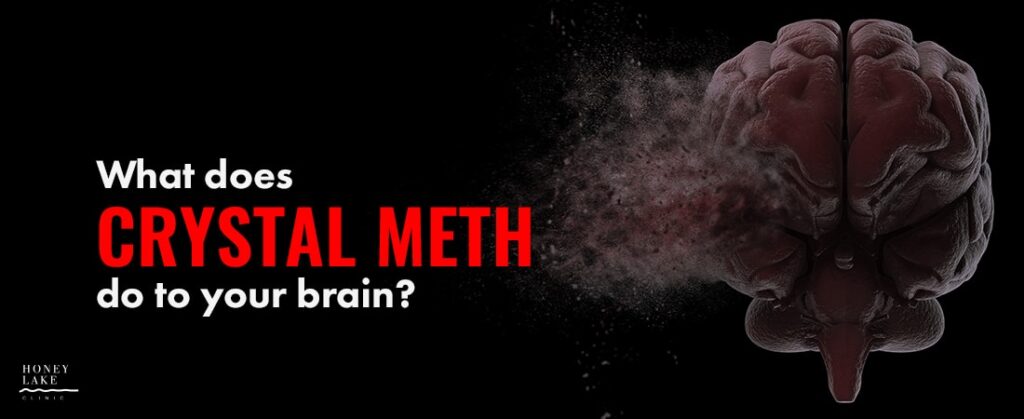What does Crystal Meth do to your brain?
Have you been wondering what does Crystal Meth do to your brain?
Methamphetamine, also called crystal meth or simply meth, is a dangerous, addictive, and often deadly man-made central nervous system stimulant. Crystal meth is made from pseudoephedrine or ephedrine extracted from cold medicines and combined with other highly corrosive and explosive chemicals available at drug and hardware stores. The substance often appears as bluish-tinted or white rocks or pieces of glass.
Consuming meth results in the release of the neurotransmitters norepinephrine and dopamine in your brain, leading to powerful euphoric feelings, increases in energy, feelings of invincibility and other psychoactive effects.
Because the substance is often cut with a number of potentially toxic ingredients such as antifreeze, battery acid or drain cleaner, it is both dangerous to use and to manufacture.
Effects on Your Central Nervous System (CNS)
Research indicates there are a number of damaging effects associated with chronic use of methamphetamine. These include:
Decreased Neurons
The use of methamphetamine is associated with decreases in the number of neurons in the Central Nervous System. The ability of the CNS to regenerate these neurons is limited, and in many cases, the loss of neurons cannot be recovered. Chronic use of methamphetamine can result in brain damage via neuronal death. Neuronal death occurs in a number of areas of the brain as a result of meth abuse that include but are not limited to:
- the hippocampus (crucial for memory and learning)
- the striatum (crucial for movement and aspects of directed attention)
- the parietal cortex (crucial in visualizing objects in space and memory)
- the frontal and prefrontal cortex (crucial in human cognition, reasoning, complex attention, problem-solving, and the inhibition of behaviors that might be damaging)
- the cerebellum (vital in various aspects of movement and a number of cognitive functions)
- and a number of subcortical structures including the basal ganglia, the reward center, the limbic system, and others
Decreased Gliogenesis
Neurons are not the only cells in the CNS. A number of other cells generally referred to as glial cells also comprise your central nervous system. These cells have a number of responsibilities, including signaling capacities, fighting infection, and developing myelin (the white matter that neurons use to effectively communicate). The use of methamphetamine has also been associated with increased damage and death to these cells in a number of brain areas, particularly in the prefrontal cortex where a number of important functions, such as attention, planning, abstract thinking, judgment, etc., occur.
Decreased White Matter
As certain glial cells become damaged and the ability to produce myelin is affected in both the brain and spinal cord, the amount of white matter in the CNS is decreased. White matter (myelin) aids in efficient singling between neurons in the CNS. White matter is located on the axons (signaling portions) of the neurons, and as this matter is decreased, neurons become less efficient in transmitting their signals. This results in a number of functional deficits.
Damage to the Circulatory System in the Brain
Methamphetamine also affects the veins, arteries, and capillaries in the central nervous system, leaving them open to clots. This results in an increased potential for an individual to have a stroke.
Long-Term Cognitive Effects Associated with Methamphetamine Use
The list of cognitive and emotional effects that occur as a result of chronic abuse of meth continues to expand based on research. Research indicates the following cognitive areas can be affected significantly as a result of chronic methamphetamine abuse:
- Attention – Various aspects of attention and concentration are affected by chronic use of methamphetamine as a result of damage to the neurons in the frontal and prefrontal cortex of the brain. Chronic issues with being able to focus, switch focus, and concentrate for lengthy periods of time are frequent.
- Judgment and Problem Solving – The damage that occurs as a result of meth abuse affects the ability to suppress impulses, and this may lead to poor judgment and problem-solving.
- Memory – The ability to encode and recall information is significantly decreased following chronic methamphetamine abuse.
- Emotional Control – Many who have chronically abused methamphetamine demonstrate emotional issues that can mood swings, chronic depression, chronic apathy, a loss of motivation, issues with aggression, hostility, irritability, and even self-harming and/or suicidal behaviors.
- Psychological Issues – Methamphetamine users are more susceptible to the development of severe psychiatric disorders, including issues with psychotic-like behaviors, such as delusions, and hallucinations.
Your Life After Methamphetamine
Substance abuse doesn’t happen in a vacuum. For real healing and recovery, the underlying causes of substance abuse must be addressed. And this is vitally important when you’re choosing a treatment program or facility.
To get at this underlying hurt and bring lasting healing takes a holistic—spirit, mind and body—approach to addiction diagnosis, management and treatment.
Many programs focus narrowly on what can be addressed from a medical perspective. Research, however, continues to show us that spirituality positively influences recovery in many ways. Although this is well known, and medical and behavioral health professionals have been saying addictions are holistic illnesses that need holistic treatment, the majority of programs still refuse to look to God in the healing process.
Different from many other treatment facilities, Honey Lake Clinic offers a residential, holistic program which treats each client on three different levels:
- Spiritual: Helping you grow closer to God, apply His truths, and discern His will for you.
- Psychological: Teaching decision-making skills to help you cope with underlying struggles.
- Physical: Using therapy and medication, if needed, to re-circuit or renew your mind.
At Honey Lake Clinic, our experienced doctors and staff will help you or your loved one bring spiritual power and clearer psychological understanding to recovery.
